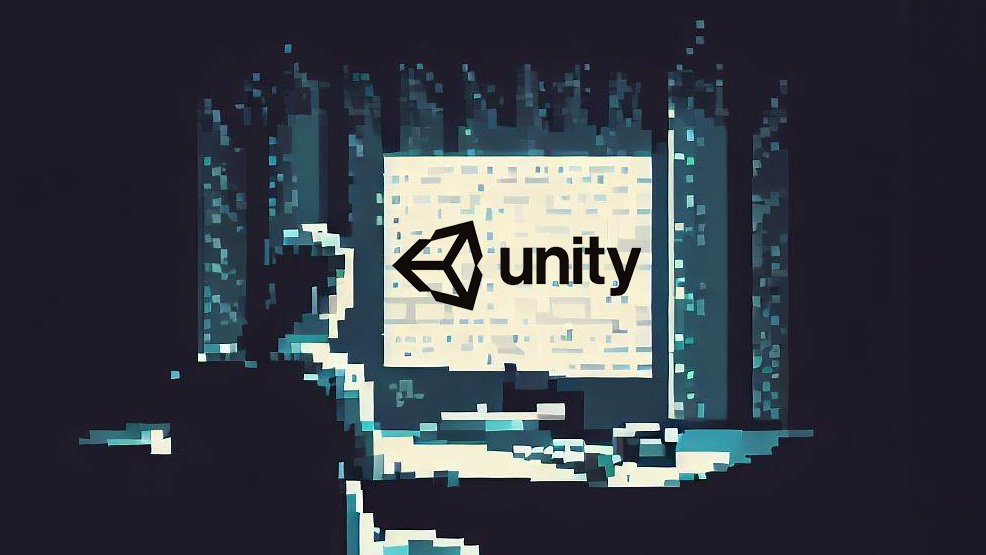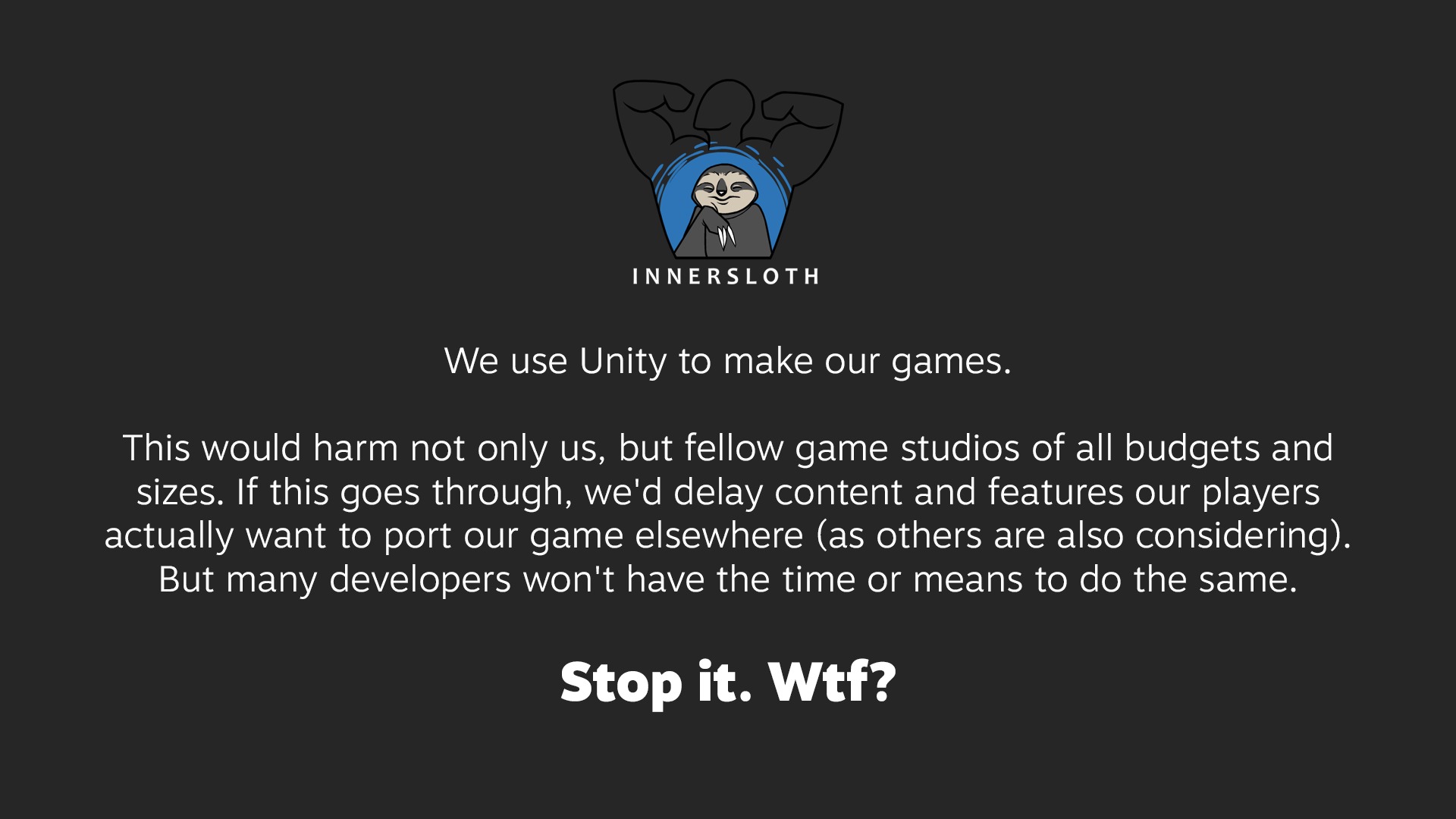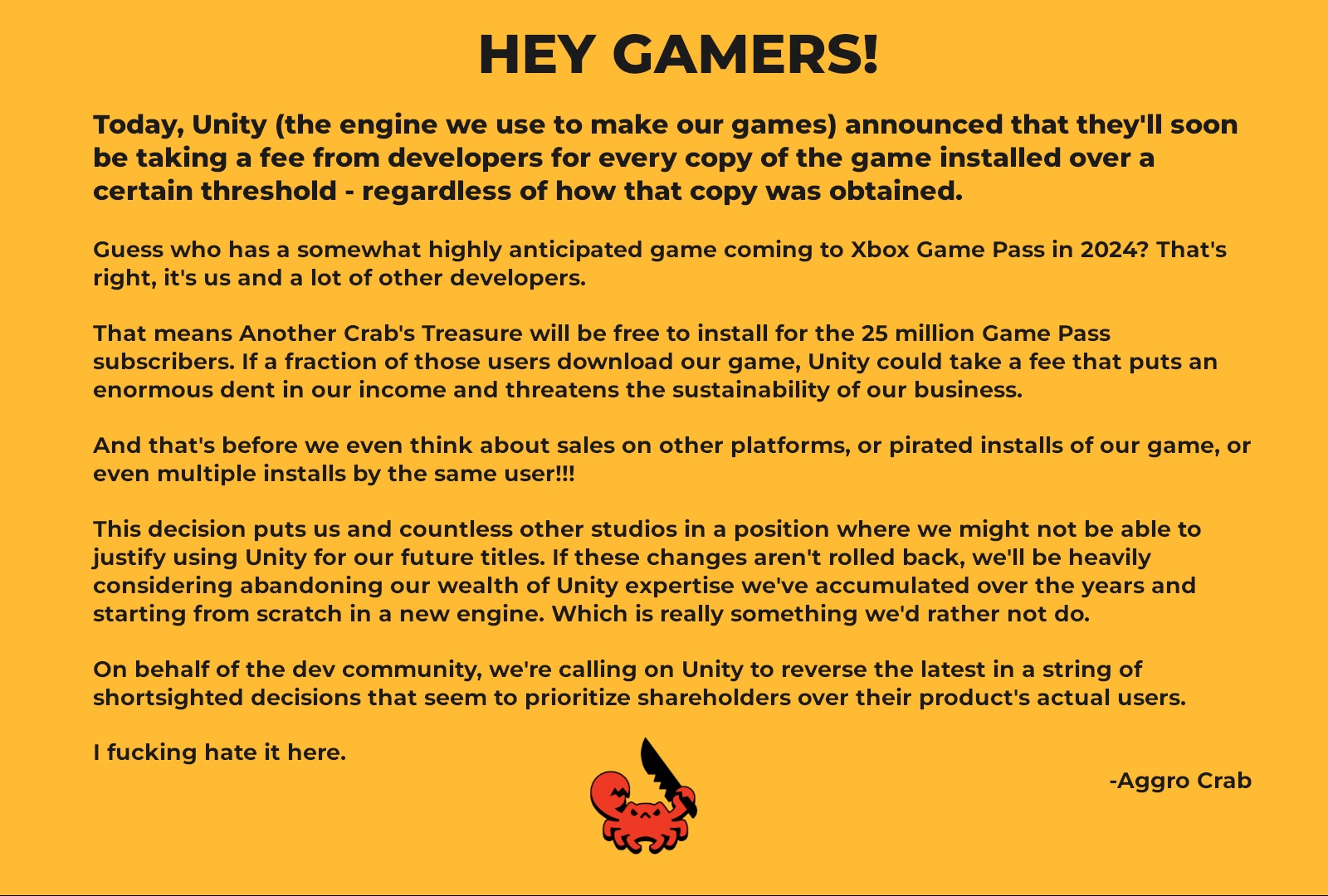Unity's controversial policy changes get rolled back, as developers pledge to quit to competing game engines (UPDATE)
Install-based fees and vague guidelines abound.

All the latest news, reviews, and guides for Windows and Xbox diehards.
You are now subscribed
Your newsletter sign-up was successful
What you need to know
- Unity is a popular engine often used by smaller teams, owing to its oft-comparatively lower fees.
- Today, the firm announced that it will follow other engines in charging a runtime fee, starting January 1st, 2024.
- The fee could potentially impact installs made via services like Xbox Game Pass, hurting the viability of business deals around the platform.
- UPDATE Sept. 13, 2023: Unity issued a statement saying that it intends to pass on the costs to Microsoft and other platform holders for installations incurred via subscription fees. We've reached out to Microsoft to comment on that.
- UPDATE Sept. 14, 2023: Unity doubled down on its proposed changes last night, issuing a lengthy explainer for its new fees. Developers continue to seek alternative toolkits, with various major companies and games proposing a switch to Unreal Engine and others. Unity also had to temporarily close its HQ, owing to anonymous death threats sent against the company and its staff.
- UPDATE Sept. 15, 2023: The San Francisco Police Department reports that the threat of violence that led to office closures was, in fact, made by a Unity employee. Developers are also sharing an open letter, calling for Unity to change course.
- UPDATE Sept. 17, 2023: Unity has announced that it's planning revisions to the new policy changes after the very public outrage from developers, studios, and the gaming community. Unfortunately, details will have to wait until Unity reveals more in the upcoming days.
- UPDATE Sept. 20, 2023: Terraria developer Re-Logic has also thrown its support against Unity's policy changes, committing to donating $100,000 to two emerging game engines, and an additional $1,000 a month, in an effort to help those open-source engines compete with Unity in power and approachability for indie developers.
- UPDATE Oct. 9, 2023: Following policy reversals, a battered share price, and ongoing trust erosion, Unity CEO John Riccitiello has retired entirely from the company.
UPDATE (Oct. 9, 2023): After battering the firm's share price, cratering faith in the company, and rolling back many of the proposals, CEO John Riccitiello is retiring from Unity. Read more on Unity's CEO departure here.
UPDATE (Sept. 20, 2023): In a surprising move, Re-Logic (the developer and publisher behind hit 2D survival-sandbox Terraria), has also joined the fight against Unity's recent policy changes. This is surprising mostly because Terraria isn't really built using Unity, aside from a "few elements on our console/mobile platforms." Re-Logic is taking a different approach, however, using the success of its game to help competing game engines succeed where Unity is currently failing.
pic.twitter.com/ZqzGMTui0fSeptember 19, 2023
To that end, Re-Logic has committed to donating $100,000 to Godot and FNA, two open-source game engines that are amassing popularity among indie developers, especially in light of Unity's controversial revenue model changes. Re-Logic is also promising to donate $1,000 a month to each game engine moving forward, further aiding the emerging engines in development and growth.
Re-Logic simply hopes that the two aforementioned game engines will remain approachable and accessible to indie developers and studios, avoiding the mistakes that Unity is currently making. It's a powerful move that speaks volumes about just how badly Unity is affecting its image in the eyes of developers.
Our original article and earlier updates continue below.
UPDATE (Sept. 17, 2023): Days after the initial announcement and subsequent outrage from a wide variety of developers and studios, Unity has announced that it's planning changes to the controversial, widely disliked policy changes implementing per-install fees for successful games built on the Unity engine. While exact details have yet to be revealed, Unity stated it has listened to feedback and is planning changes to the policy to be revealed in a couple of days.
We have heard you. We apologize for the confusion and angst the runtime fee policy we announced on Tuesday caused. We are listening, talking to our team members, community, customers, and partners, and will be making changes to the policy. We will share an update in a couple of…September 17, 2023
While this could be good news for developers and studios, it may be too little too late. The response from the community has been doubtful at best, as many consider the trust in Unity to already be shattered. It'll be difficult for the company to backtrack enough to regain the confidence and trust of the myriad of developers very publicly decrying the upcoming revenue model changes.
All the latest news, reviews, and guides for Windows and Xbox diehards.
The language Unity used to share this announcement also suggests that the revenue model changes are not being reversed entirely and instead are being revised, which simply may not be enough to win back favor. Elsewhere, the use of words like "confusion" and "angst" have drawn more ire from the community, as the anger from developers regarding the change was palpable.
We'll have to wait for details, however, as Unity stated the policy changes will be announced in a couple of days. There's still a lot of unknowns here, and the longer Unity waits the more developers will solidify plans to move to alternative game engines.
UPDATE (Sept. 15, 2023): Yesterday, Unity closed two of its locations temporarily owing to a "credible" death threat made against the company. Many had assumed that this was either a Unity customer, an external sympathizer, or a random internet troll. However, the San Francisco Police Department confirmed to Polygon that the threat was in fact made by a Unity employee, without providing further details.
The fallout over the pricing structure continues, with more developers pledging to leave Unity, including the developers of popular Xbox Game Pass mainstay Slay the Spire. Some mobile developers have banded together and pledged to disable Unity's ad service within their games unless installation clauses are reviewed. The open letter is over here.
Other commentators such as Microsoft developer inXile mocked Unity's retroactive terms. InXile developed Wasteland 2 on Unity, and the franchise is now owned by Microsoft, potentially setting the stage for a legal dispute. However, some commentators actually came out in support of Unity recently, pointing out the fact that the platform has rarely seen any form of profitability. Others highlighted the fact that Unity overpaid for companies like Weta Digital, and offered massive packages to its executive layer — money which could've helped the firm see profitability without skewering indie devs in the process.
As the days go on, it seems increasingly unlikely that Unity will backtrack on its new fee structure. We have yet to hear from major players that stand to lose out like Microsoft, Mihoyo (Genshin Impact), Tencent, or Activision — many of whom are ultimately who Unity seeks to target with this new pricing structure. Smaller developers have been caught in the crossfire potentially. We'll have to wait and see how it'll play out.
UPDATE (Sept. 14, 2023): The Unity saga continues. Last night, the company issued a lengthy statement regarding its proposed changes, although it fell short of rolling back or changing course. Various major developers of all shapes and sizes continue to pledge to either delete their games from Steam to prevent retroactive charges, while committing future games to different engines, such as Unreal. Developers continued to criticize the firm despite the below post, owing to the widespread abuse of trust.
Facepunch Studios' Garry Newman outlined the Rust maker's stance in a blog post here, you should definitely read. It details in general why developers are angry about these changes, given the fact that businesses have to plan games far in advance of producing them, cost things out appropriately — only for Unity to have upended the rules out of the blue.
Unity has so far refused to share information on how it plans to track installations, prevent abuse and "bad faith" installation spam, or offer transparency on how it will levy said fees. Neither Unity nor Microsoft have clarified how the installation fees will impact services like Xbox and PC Game Pass.
We want to acknowledge the confusion and frustration we heard after we announced our new runtime fee policy. We’d like to clarify some of your top questions and concerns:Who is impacted by this price increase: The price increase is very targeted. In fact, more than 90% of our…September 13, 2023
To make matters worse, Unity reportedly had to shutter its offices in Houston, Texas, and San Francisco, California following threats made against its premises and staff.
This storm is perhaps Unity's biggest-ever crisis and has led to widespread calls for CEO John Ricitiello (a former EA CEO who won the firm "Worst Company in America" previously), to step down.
UPDATE (Sept. 13, 2023): Unity has issued some "clarifications" around certain aspects of the deal, although it continues to endure heavy criticism from every side of the industry.
Stephen Totilo of Axios reported that Unity intends to pass on the costs for installation fees to Microsoft and other subscription providers for services like Xbox Game Pass and PlayStation Plus. We've reached out to Microsoft to comment on this, since it appears that Unity seems to be making this up its policies as it goes along. Unity also said that it will waive all the installation fees for developers who adopt its ads platform on mobile, in a coercive move which one developer at a major mobile publisher stated to me could be in breach of EU contractual law.
George Broussard of 3D Realms fame also reported that Unity was warned internally that it would be hammered for failure to clarify things like fraud and Xbox Game Pass, but shipped the blog post anyway. Outlets like Eurogamer have also highlighted the fact that Unity's CEO and other execs mysteriously offloaded a bunch of stock in the past month as if they knew this particular announcement would be incredibly unpopular.
As of writing, Unity is sticking to its guns, despite companies like Among Us' InnerSloth and Cult of the Lamb publisher Devolver Digital implying or outright confirming plans to move away from Unity as a platform.
Keen to capitalize on Unity's meteoric fall from grace, rising engine Godot announced a new fund to help its platform grow. Godot is a free and open source alternative to Unity, and has been rising in popularity since former EA exec John Riccitiello took over the firm. John Ricciteliello became notorious in the past for saying that developers who don't focus on microtransactions are "fucking idiots," while also saying he'd like to charge Battlefield players to reload their guns.
UPDATE (Sept. 12, 2023): More developers react.
More developers are joining the debate surrounding the new Unity revenue model, including Innersloth, most known for its hit multiplayer game Among Us. Innersloth added its own message on top of Aggro Crab Games, adding to the growing call for Unity to reverse its decision.

Innersloth has stated that the change to Unity's revenue model would directly lead to the studio delaying content and features in order to port Among Us to another game engine. Of course, there are plenty of studios and independent developers that wouldn't have the resources necessary to make such a move, which makes matters even more dire for indie games built on the Unity engine.
Massive Monster, the creator behind the excellent Cult of the Lamb joined the fray, too, telling players to buy Cult of the Lamb now before it deletes the game on Jan. 1 (when Unity's new revenue model goes into effect). It's said in a joking fashion, but also highlights that even delisting the game would potentially not stop Massive Monster from accruing fees, since Unity will be tracking installs, not purchases.
UPDATE (Sept. 12, 2023): Developers have begun openly decrying the new changes at Unity, requesting that the company go back on the new per-install fees lest they're forced to abandon the game engine in favor of something else. One notable example comes from Aggro Crab Games, which is working on the highly-anticipated Another Crab's Treasure coming to Xbox, Windows PC, and Xbox Game Pass in 2024.

The Aggro Crab Games team expresses concern that Unity's new model will disproportionately affect indie developers, especially those that take advantage of Xbox Game Pass to reach huge new swathes of potential players. If even a fraction of the over 25 million Xbox Game Pass subscribers download an Aggro Crab Games title built on Unity, for example, the resulting fee could significantly hurt the studio and its ability to continue producing games. This is before considering pirating, multiple installs from the same user (and potential spamming on this front), and releasing on different platforms.
The reaction to Unity's decision to implement per-install fees on games above a certain level of success has been almost unerringly negative from both developers and the video games community. It remains to be seen if the public outcry will affect Unity's decision, but we'll keep this space updated with every new development.
Unity is a popular game and app development platform, often touted for its cross-platform friendliness and accessibility for smaller teams. Unity has been at the forefront of independent development for some time, although a string of unpopular changes in the past couple of years have dramatically battered its image. The changes kicked off in line with its public stock exchange listing a couple of years back, generally speaking, as it seeks to compete with Unreal Engine and others in an increasingly competitive, and volatile market.
Volatile indeed, as these recent changes to Unity's revenue models threaten to upend entire businesses, and plunge projects into turmoil before they've even gotten off the ground.
Unity's new model will see developers pay a monthly fee per installation, scaling up at certain thresholds. The breakdown of the fees per revenue thresholds is as follows.
The per-install fees don't seem to account for game usage time, and there's no information on whether these metrics will factor in pirated copies as well. The per-installation fee also threatens charity services like Humble Bundle, free-to-play titles, or even Xbox Game Pass — where games are less likely to go on to generate ongoing revenue via in-app purchases. If someone downloads a title on Xbox Game Pass and tries it out for just 15 minutes, with no intention to purchase later or get invested, this has some dire potential ramifications for developers who take on the Xbox Game Pass model. Unity has yet to really clarify how the fees may or may not be waived in certain scenarios.
One developer remarked that some metrics could see Unity stand to profit from a freemium game more than developers of certain sizes.
> make a game> game is fremium> game makes 200k from in-app purchases after being installed 3 million times > now owe Unity 20c per 2.8M installs, $560K> that’s 360K more than we made https://t.co/6fe6Ob35OjSeptember 12, 2023
Another developer, Tomas Sala known for the excellent flight action game The Falconeer, also expressed concerns about Unity's handling of this quite massive change. Games and projects that are currently in development will have not factored in the additional fees Unity plans to levy, throwing existing plans into turmoil.
What I also dislike also about this @unity debacle. I already committed to their engine for my new game. Put years and years of work into my pipeline. I did so under a simple per seat license I am happy to pay.Now while I am close to release they spring something new on me.…September 12, 2023
Unity as a business has not had many profitable quarters. For 2022, its operating income was negative one billion dollars, which is less than ideal by most metrics. In May of this year, Unity also announced it would commit to mass layoffs to reduce costs, shedding 6% of its global workforce. Unity's share price is down 55% since its initial public offering, and down 10% for this year alone, as the platform continues to seek consistent profitability.
Disunity
Unity's financially accessible models previously gave it a competitive advantage over Unreal Engine, which operates some similar fees for game developers using its platform. With that advantage being eroded, it remains to be seen if developers pack up and move to greener pastures. It also remains to be seen how it could impact deals for subscription services like Xbox Game Pass or PlayStation Plus, which often feature Unity-made independent games from smaller teams, often at lower prices.
Unity's fees eating into the margins may make certain ventures increasingly unviable, in what is proving to be a particularly strange, volatile market. 2023 has seen studio closures and layoffs a' plenty, as consumers feel the pinch of inflation and increased prices around the world. Unity is potentially playing a dangerous game here, but it remains to be seen what impact this could have on its business at scale, once it rolls out on January 1st, 2024.

Jez Corden is the Executive Editor at Windows Central, focusing primarily on all things Xbox and gaming. Jez is known for breaking exclusive news and analysis as relates to the Microsoft ecosystem — while being powered by tea. Follow on X.com/JezCorden and tune in to the XB2 Podcast, all about, you guessed it, Xbox!

